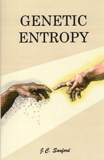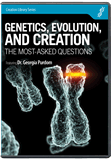
Bees and Orchids: Which is “Evolving” Faster?
Orchids pack their pollen on perfume-seeking bees.
News Source
- U.C.–Berkeley: “Bees Outpace Orchids in Evolution”
Many species of orchids depend on specific species of male bees for pollination, and the corresponding bees likewise depend on orchids for fragrances to facilitate their mating practices. The orchid attracts the bee and attaches a mass of sticky pollen to it. The blob of pollen is later scraped off in an orchid of the same type. How did such mutualistic associations develop?
Evolutionists have assumed these organisms co-evolved “nearly simultaneously”1 in a back-and-forth stepwise fashion. Nevertheless, “the evolutionary processes that gave rise to these associations remain poorly understood.”2
In an effort to sort out this “chicken-or-the-egg” mystery, a Berkeley research team led by Santiano Ramírez combined DNA-sequencing of many euglossine bee species and the pollen they carried with chemical analyses of orchid fragrances and the compounds collected by the bees. Ramírez was surprised to learn that the bees could obtain 90% of the chemicals they seek from sources such as tree resins, fungi, and rotting vegetation. Thus, the mutualistic dependence is quite one-sided. The orchids need the bees more than the bees need the orchids.
After comparing genomes and analyzing molecular clock calculations, the Berkeley team concluded that euglossine bee species diverged from their common ancestor 12 million years before euglossine-pollinated orchids diverged from theirs. Therefore, the researchers conclude that the orchid varieties that were able to produce those particular volatile chemical compounds already being sought by the bees had a reproductive advantage.3 Natural selection thus culminated in the mutualistic pairings we see. Ramírez said, “It appears that the male bees evolved a preference to collect these compounds from all kinds of sources, and the orchids converged on that chemical preference millions of years later. . . . The bees evolved much earlier and independently, while the orchids appear to have been catching up.”
The Berkeley study combines observational science with speculation. The genome analyses, the chemical analyses of the fragrances produced by orchids, and the chemical analyses of the chemicals sought by bees are solid observations. It does appear that the orchid-bee mutualism is a somewhat lop-sided dependence. The researchers reasonably suggest that orchids able to provide chemicals for which the bees already had a sensory bias4 possessed a reproductive advantage.
Since the genomes being compared were of the same kinds of organisms, the observed differences are variations within a created kind. However, the millions of years inferred from the data spring from unverifiable assumptions. Molecular clock calibration here depends on assumptions about mutation rates required for speciation and more assumptions about the dates of the fossil record.
These researchers themselves note, “Molecular clock estimates may suffer from biases due to incomplete lineage sampling, substitution rate heterogeneity, or sparse fossil data.”
These researchers themselves note, “Molecular clock estimates may suffer from biases due to incomplete lineage sampling, substitution rate heterogeneity, or sparse fossil data.”5 And what fossil data there is has been dated according to additional unverifiable assumptions about radiometric dating.6
The researchers note that the molecular clock data agrees with that of previous studies, but those studies suffered from the same “biases”; therefore, these studies should not be used to verify each other.
Biblically, we know that God made all kinds of plants on the third day of Creation week and flying insects on the fifth day. God created plants and animals to reproduce successfully, so we can conclude that He created some organisms capable of forming productive partnerships such as we see here. The genetic capacity to vary would enable some organisms to establish new mutualistic partnerships as conditions change. But we know that over time some organisms can fail to adapt and become extinct. (By the way, extinction is also explained in the Christian worldview: the Bible in Genesis 3 teaches that Adam’s sin brought death to animals—and humans—as God cursed all of creation.)
No evolution of new kinds of organisms is being discussed here but only the interaction and interdependence of variations within created kinds. The actual time of appearance of plants was just two days before the appearance of their insect pollinators, not 12 million years. And the intricate mechanisms by which an orchid packages and attaches its pollen packet to its bee smacks of “irreducible complexity” designed by our Creator. Biblical principles explain the origin of mutualism. Read more about it at “God Created Cohorts” and “God Created Plant Pollinator Partners.”
Further Reading
- Get Answers: Design in Nature
For More Information: Get Answers
Remember, if you see a news story that might merit some attention, let us know about it! (Note: if the story originates from the Associated Press, FOX News, MSNBC, the New York Times, or another major national media outlet, we will most likely have already heard about it.) And thanks to all of our readers who have submitted great news tips to us. If you didn’t catch all the latest News to Know, why not take a look to see what you’ve missed?
(Please note that links will take you directly to the source. Answers in Genesis is not responsible for content on the websites to which we refer. For more information, please see our Privacy Policy.)
Footnotes
- Santiago R. Ramírez et. al., “Asynchronous Diversification in a Specialized Plant-Pollinator Mutualism,” Science 333, no 6050 (September 23, 2011): 1742–1746, doi:10.1126/science.1209175.
- Ibid.
- Ibid.
- Ibid.
- Ibid.
- See “Radiometric Dating: Back to Basics,” “Radiometric Dating: Problems with the Assumptions,” “Radiometric Dating: Making Sense of the Patterns.”
Recommended Resources

Answers in Genesis is an apologetics ministry, dedicated to helping Christians defend their faith and proclaim the good news of Jesus Christ.
- Customer Service 800.778.3390
- © 2024 Answers in Genesis





